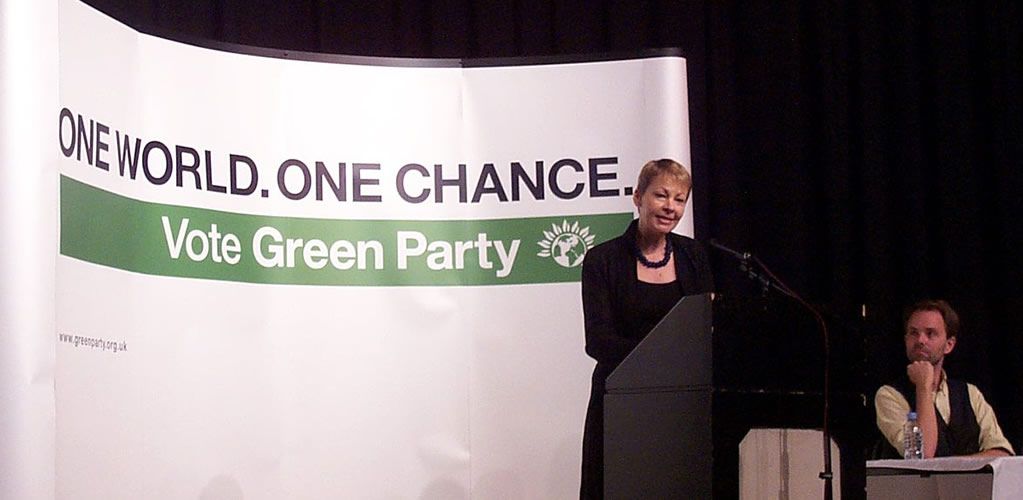Caroline Lucas and the heavy burden of being a party’s only member of parliament
As the only Green parliamentarian, Caroline Lucas has served as a constituency MP but also as a representative of the hundreds of thousands of other people who vote for her party.

As the only Green parliamentarian, Caroline Lucas has served as a constituency MP but also as a representative of the hundreds of thousands of other people who vote for her party.
G reen MP Caroline Lucas’s announcement that she will be leaving parliament at the next general election will have come as a surprise to many. Elected in 2010 as the party’s first-ever MP, overturning a pretty thumping Labour majority, she has become something of a force to be reckoned with in Westminster.
From the minute she stepped foot in the House of Commons, Lucas was aware that her position as the sole member of a political party made parliamentary life more difficult to navigate. Party is everything in the House of Commons. It determines how often you get to speak and, most importantly, how much information you get about what will be happening and when. The government controls most of the parliamentary timetable, deciding what business is to be debated each day and ultimately, when votes will happen. Lucas even wrote a book on her experiences as the Green’s only MP, highlighting the absence of any “honourable friends” in Westminster to guide her.
It would be wrong to say that these pressures have made her an unsuccessful MP. In fact, quite the opposite. Lucas is probably the best example of how a sole MP should operate in the Commons. She punches well above her weight as Green MP, asking nearly 4,000 written questions to government ministers since 2010, with an impressive number of spoken contributions to boot, including a significant number of questions to the prime minister.
In recent years, House of Commons speakers have been much more explicit in recognising the position of smaller party MPs in the House of Commons chamber, ensuring that Lucas (along with Plaid Cymru, the Liberal Democrats and others) are all called to speak in important debates. This has helped to ensure a guaranteed platform for her and her party during the big debates on Brexit and its fallout, as well as the COVID pandemic.
In her resignation letter, Lucas talked about the “particular responsibilities” of being the Greens’ only MP and the impact this has had on her ability to do the job she wants to do as an MP.
Every MP wears two hats – as constituency MP and as parliamentarian. And there is a tension in the parliamentary role of a sole party MP that is absent for the average Labour or Conservative Party backbencher. For they essentially wear a third hat – they are the only voice of their entire political party in the House of Commons.
There is another added weight in the knowledge that they are not just a constituency MP but the only available representative in parliament for everyone who voted for their party. Lucas recognised this in her first speech in the House of Commons. She is not just the voice of her constituents in Brighton Pavilion, she is the voice of the 835,000 people who voted Green in the 2019 general election.
In this way, sole party MPs occupy a unique space. They must serve as both backbench and frontbench members of their party, essentially shadowing every single government department.
In practice, this means a great deal more pressure on their time. If a minister attends the House of Commons for questions or to give a statement, if there is a debate on an important piece of legislation or a topic of much importance, they will need to be present in order to be their party’s voice.
Other small parties have the same dilemma. Plaid Cymru’s Ben Lake, for instance, is shadowing no fewer than seven government departments at the moment. It’s hard work and it requires a good support team in Parliament. For this, parties are dependent on Short money – public funding for the opposition that depends on party performance in elections. Where this has been insufficient, Lucas has been assiduous in crowdfunding in order to maintain a support team and “skewer ministers” with parliamentary questions.

Caroline Lucas MEP, Elise Benjamin (Deputy Lord Mayor), and Colin Hines discussing the Green New Deal in Oxford. | CREDIT: WIKIMEDIA/KAIHSU TAI
Stretched too thin
The need to be the entire parliamentary face of the party makes it difficult to specialise and to carve out the time needed to focus on policy priorities. It is this that seems to have been the rub for Lucas. Those looking on might find this hard to believe as her work on climate and environmental issues is very prominent. She’s been a member of the Environmental Audit Committee for almost her entire time in the House of Commons and is chair of the All-Party Parliamentary Group on Climate Change. This is on top of her regular interventions. But she clearly wants to do more.
More often than not, opposition parties are on the back foot, responding to the parliamentary agenda set by the government rather than being able to shape it. It can be frustrating to be in this position.
Lucas has always been keen to get out of the Westminster bubble and be on the frontline of the campaigns she is passionate about. Her arrest while joining anti-fracking campaigners at the Balcombe oil drilling site in 2013 is often raised as an example.
We could also point to a time shortly after her election back in 2010 when she interrupted a parliamentary debate on the fixed-term parliaments bill to voice her disgust at what she had seen while joining tuition fee protesters down the road from parliament. Having seen first-hand the unnecessary kettling of students and schoolchildren she demanded that the home secretary come to the House of Commons to make a statement.
Any green MP elected in place of Lucas will also need to navigate these tensions. If, however, we see a few more Green MPs elected then the job could become slightly easier. And with record results in this year’s local elections, that looks like a greater possibility than it has been before.

Sources
▪ Text: This piece was originally published in The Conversation and re-published in PMP Magazine on 10 June 2023. | The author writes in a personal capacity.
▪ Cover: Wikimedia/Kaihsu Tai. - Caroline Lucas. (Licensed under a Creative Commons Attribution-ShareAlike 4.0 International License.)








[Read our Comments Guidelines]